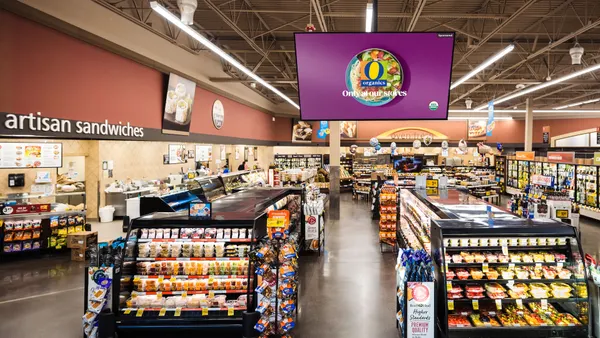Dive Brief:
- Marc Jacobs, the U.S. fashion label owned by luxury goods giant LVMH, received more than 61 million social media impressions in an experimental Uber activation campaign for its Daisy fragrance. Sweden Unlimited, the digital agency that created the campaign, won the "Best Campaign by a Beauty Brand" at the Glossy Awards last week, according to Luxury Daily.
- The "Daisy Daze" campaign launched in March 2016 and was exclusive to the New York market. An Uber car decorated with daisies and bearing the #MJDAISY hashtag was available to hail throughout parts of Manhattan and Brooklyn. Users had to opt in to participate in the promotion and to hail a ride using the promo code “MJDAISY” in the Uber app. The branded Uber car featured a custom soundtrack and free full-size bottle of the fragrance.
- Uber received 5,459 ride requests from users during the six-hour promotion. The promotional code was applied 4,836 times in the app, and about 200 trips were completed in the flower-filled car. The campaign prompted headlines in Harper’s Bazaar, Elle, InStyle and New York magazine’s The Cut, among others.
Dive Insight:
Last year, all of Uber’s recent troubles seemed far away. But the ride-hailing company’s travails, including the resignation of CEO Travis Kalanick after several scandals, shouldn’t detract from the success of the Marc Jacobs campaign to raise awareness of its new fragrance.
In this effort, which was the first time a brand partner decorated the inside of an Uber, the retailer lined the car's seats with artificial daisies, leis and sunglasses to inspire user-generated content on social media. Clearly, it worked. Instagram posts from influencers and editors received more than 278,000 likes for Marc Jacobs as well as coverage from several major magazines and publishers. Given that Uber depends on smartphone users to catch rides, the promotion deftly generated viral publicity on social media apps and among major brand influencers.
This year, Uber was criticized for picking up passengers at New York’s JFK airport while taxi companies protested the Trump administration’s travel ban on seven Muslim-majority countries. Before leaving his role, Kalanick took an indefinite leave of absence as Uber released a damning report on its workplace culture that called on the company to “review and reallocate” his responsibilities.
As part of the company’s efforts to repair its damaged brand, Uber should take more steps to work with established brands and advertisers in ways that could likely generate good will toward the company and remind mobile users of the company’s innovations and convenience. Uber’s huge success early on bred arrogance and complacency, while its internal brand suffered with the mistreatment of employees. As the ride-hailing industry grows more crowded with Lyft, Via and other services, and Uber loses its first-mover advantage, the company will need to act quickly to rebuild its reputation.









